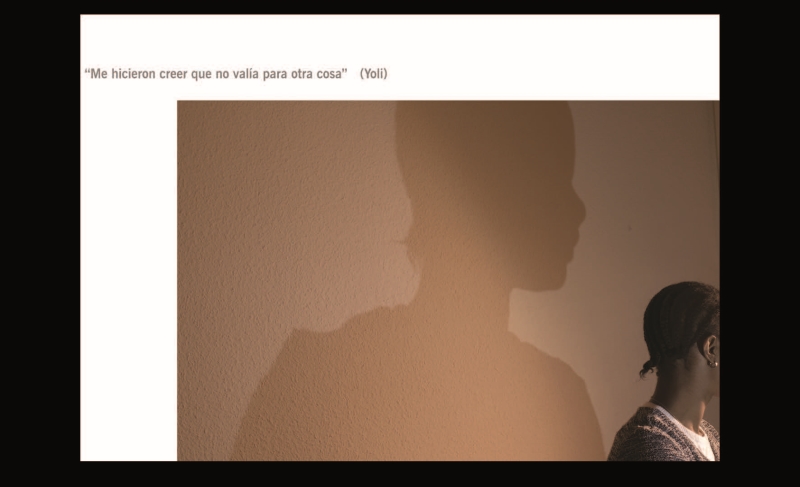Spain, 07/13/2022. Sr. Marta Elena Vélez Betancur.- Our resounding ‘no’ to human trafficking has its direct expression in Article 4 of the Declaration of Human Rights: "No one shall be held in slavery or servitude; slavery and the slave trade shall be prohibited in all their forms".
It is clear that this formulation is a great wish and that it has advanced humanity at many times and in many places. But it is also clear that its universal fulfilment is a distant horizon towards which we walk with uncertain steps and more than a few setbacks. Year after year, we continually denounce this situation, the bleeding cases of pure and simple slavery that occur throughout the world and also among us.
From our origins, Marie Poussepin "took with her young girls from the countryside, without asylum and without resources", to "educate them in the fear of God, to teach them to work for a living" and "to make them capable of avoiding the disorders to which misery and ignorance expose them", in response to the needs of her time, which she perceived as a call from the Lord. She established her work according to two primary orientations. "The community will always regard as one of its principal duties the instruction and education of youth".
But perhaps our denunciation needs a broader view, which we find already contained in the preamble of the Declaration of Human Rights. "Freedom, justice and peace in the world are founded on the recognition of the inherent dignity and of the equal and inalienable rights of all members of the human family. Ignorance and contempt for human rights have led to acts of barbarism outrageous to the conscience of mankind". Without this understanding of human dignity, rights have no ground to stand on.
The same society that proclaims human rights has created a mercantilist mentality, with economic profit and personal satisfaction as the supreme criteria, regardless of ethical limits. In extreme cases, we find those who plan to trade in people, as if they were any raw material. On a small scale, we run the risk of valuing people for the benefits they bring us on a social, emotional, work, sexual, economic level... maintaining distorted human relationships, far removed from the recognition of the value of each person. This way of relating is a fertile ground for individualism, egocentrism, indifference and apathy to germinate and grow and consequently the more or less unconscious collaboration and complicity with the exploitation of human beings.
In many places, inequality and the subjugation, whether gross or subtle, of a part of the population is so normalized, so well managed in education and the means of social media, that it is difficult for people, especially women, to be aware of the manipulation and exploitation they are suffering, even sometimes in such harsh realities as human trafficking.
So how can we talk about empowerment? Empowerment of trafficked persons requires a touch and a process.
A touch in the depths of every human being, woman or man, where there is a core of dignity, recognized or not, inaccessible to others, undeniable for the person herself. In this core lies the strength to open one's eyes, to get up, to walk again, to raise one's head... despite all the suffering, contempt, violence, that one has endured; any event that puts the person in contact with it is the spark that can initiate the process of empowerment.
The process will be slow, long and difficult, with many things going against it; a process of encountering oneself and others. A process of de-victimization that leads to discovering, recognizing, assuming and celebrating one's own dignity, freedom and capacities. It will be easier if it is accompanied, if other people close to them believe that it is possible and show it with their attitudes, respecting and encouraging, relating as equals, as fellow travelers and it will be less difficult if they are given the means to which they are entitled.
In our empowerment, that of the "non-victims", a touch and a process are also necessary. The touch that opens us to be aware of what concept of personhood and personal relationships are revealed in the practice of our lives. The process that together with others, with many others, leads us to work tirelessly for the human family of equals in dignity and freedom that we are capable of building.
From the community of Madrid, we are working in the Observatories de DDHH Samba Martine, Dominican family; and with other congregations: the Oblates and the Adorers in different volunteer works where there is no lack of work.
 "They made me believe that I was worth nothing more" (Yoli)
"They made me believe that I was worth nothing more" (Yoli)
https://www.conferenciaepiscopal.es/jornada-de-oracion-y-reflexion-contra-la-trata-de-personas-2022/
See in quotation marks:
- Human Rights and Human Trafficking. United Nations New York and Geneva 2014. Human Rights Fact Sheet No. 36
- RG: XXVII. General Rules. Dominicans Presentation
- Article: Marta Elena Vélez . JPIC Delegate Province of Spain
- Mª Dolores García Maquívar. Community of Madrid. Province of Spain who works in this field of trafficking.
- Photos: by Fernando Mármol Hueso, who made possible the travelling photo exhibition: “Punto y Seguimos. La vida puede más”.


 EN
EN  ES
ES  FR
FR 



